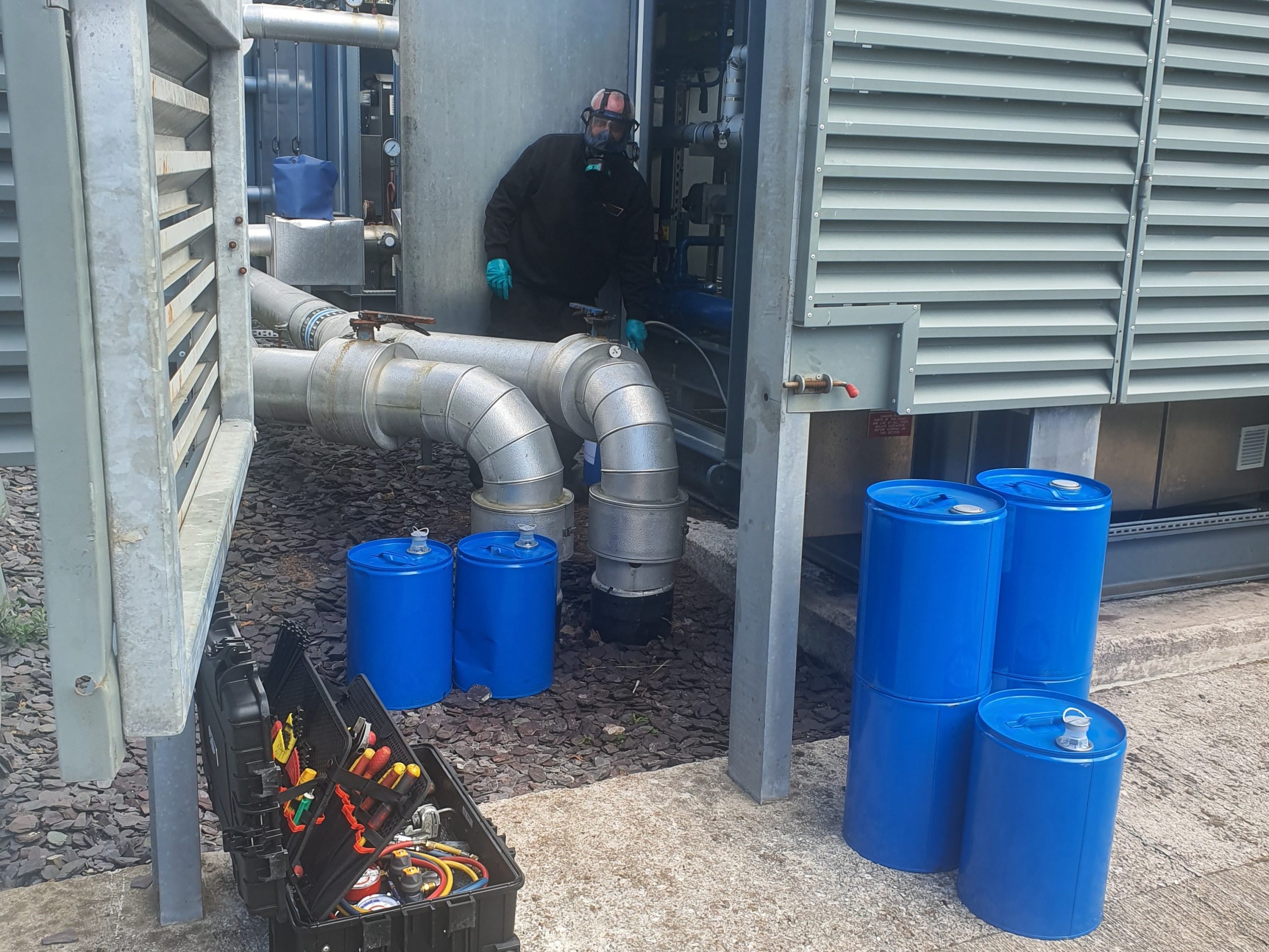Reciprocating Compressors
Industrial chiller maintenance including a reciprocating compressor with 8 cylinders. They always have an even number of cylinders so that the compressor is balanced.
Open Drive
Because the refrigerant being used in this article is ammonia, the compressor is open drive. This is because ammonia corrodes the copper windings of the electric motor. An open drive compressor needs a shaft seal to prevent oil and refrigerant escaping from the system. These shaft seals are prone to wearing down and leaking. They have two mating surfaces that have a finish so smooth that it is like glass. Any oil leaking out of the system collects in a pot. This pot is monitored for the rate at which it fills up and so the deterioration of the shaft seal can be monitored. The swap out of the shaft seal can be arranged at a convenient time. This evolves the splitting of the shaft coupling to allow access to the seal.
Semi Hermetic
This means that the electric motor is internal to the compressor. Hermetic meaning sealed and semi meaning that you can bolt components off, such as, the cylinder heads. There is a significant advantage with this type of compressor design as there is no shaft seal. The compressor motor windings are also cooled by the suction vapour returning to the compressor from the refrigerant system. This compressor design is used with HFC, HFO, CO2 and Propane refrigerants. There are some semi hermetic compressors that are suitable for ammonia where the windings have been sealed from the refrigerant.
Scheduled Strip Down
This kind of compressor has a lot of moving parts that need to be replaced according to the run hours of the compressor. Failure to do so will lead to the compressor going out of balance and an expensive compressor smash up occurring. Usually during a smash up, a connecting rod will fly off causing oil to spurt out from the gallery. This causes a low oil pressure fault which stops the machine. One smash up which I have seen involved all the con rods staying on and flailing round the inside of the compressor. One cylinder was still working, the compressor still running and a sump full of different sized triangle pieces of metal! This highlights the importance of scheduled maintenance.
0161 237 3727
service@maximuschillers.com
Major Industrial Chiller Maintenance
On a recent Major maintenance visit, the scheduled oil change was carried out. The required oil being selected by our oil analysis process to the correct viscosity for a Grasso reciprocating compressor operating at a 1°C saturation.
Oil Drain Out during Industrial Chiller Maintenance
The compressor was valved off from the rest of the system. The standing pressure of the vapour in the vessel was 5.8 bar. On the bottom of the sump is located an oil drain port, this is because it is the lowest part of the system. Using hoses and a valve, the oil was drained into empty oil drums.
Oil Pumping during Industrial Chiller Maintenance
Our engineer removed the old oil for recycling, then lifted the new oil to the work location. He used his portable oil pump to pump the oil in using the same port from which the oil was drained. The oil came to the correct level on the oil sight glass and the vapour was bled from the oil filter so that the compressor was primed with oil. When the system starts, the oil pump pushes the oil through to the cylinders of the compressor.
Industrial Chiller Maintenance Monitoring
The oil heater was switched on until the oil was 46°C. The chiller was then started and run tested. The Delta P across the oil filter was found to be nominal at 0.5 bar. The oil level remained at the correct level as the three way valve opened to the oil cooler. The oil cooler, in turn being cooled by a cooling loop which uses some of the tubes on the air cooled condenser.
0161 237 3727
service@maximuschillers.com
Industrial Chiller Maintenance and the MAXIMUS ADVANTAGE™
Any Chiller
We work on all kinds of chillers from the smallest Italian process chillers, through to large air cooled chillers and centrifugal chillers used for industry.
Any Problem
Problems are our bread and butter- that’s what we do best! Whether you require centrifugal compressor remanufacturing, or the system drying out after a burst heat exchanger- it’s all in a day’s work.
Any Part
We have an excellent supply chain where we pride ourselves on sourcing any part for your chiller. Where a part is no longer manufactured or is not available- we fit a different part. A chiller is just a chiller at the end of the day- we can achieve the same or better design characteristics and efficiency with a different part.
Any Refrigerant
HFC refrigerants are being phased down but are still the most popular variety. They are being superseded by HFO refrigerants which will become more popular over the coming years. We are also adept in the handling of natural refrigerants, such as, ammonia, propane and carbon dioxide.
Anywhere
When you do something as niche as what we do- you cannot expect to just work outside your back door. With blue chip customers around the UK and around the world- nowhere is too far for Maximus Chillers.
To read more about reciprocating chiller compressors hit the Tag below.
Related Articles:
Air Cooled Chiller Planned Maintenance
Process Chiller Maintenance Visit
Chilled Water System Maintenance
Air Cooled Chiller Condenser Maintenance
Planned Preventative Chiller Maintenance
Air Cooled Chiller Maintenance
Preventative Chiller Maintenance
Read about polyolester oil on Wikipedia

